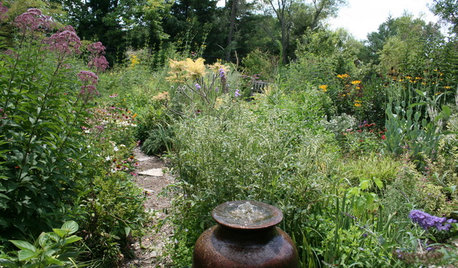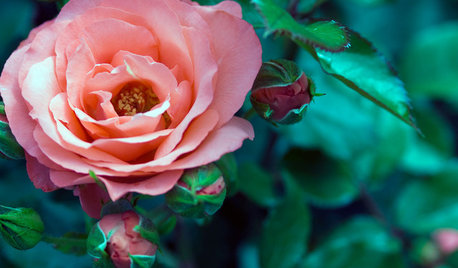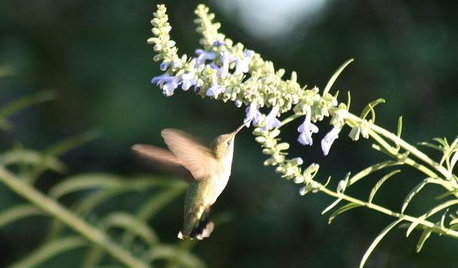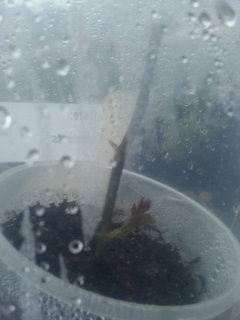2014 Edition-What I learned in the garden
It is a bit early.
But what I have learned in the garden this year so far:
Sharpee's fade in the sun fast on cutting tags (the colored ones even faster)
Some roses harbor the secret desire to be tree climbers, Darcey Bussell has reached the top of the very old very tall plum tree.
Just because you peg a rose does not mean it will bloom along the cane. All 12 feet of one cane of Lady of Megginch have no signs of doing anything other than bloom at the tip. I still love her bloom, but she will find herself living in a different part of the garden soon.
What about you?
Comments (31)
ingrid_vc so. CA zone 9
9 years agolast modified: 9 years agoI learned, unfortunately, that a garden grown without sufficient winter rains is only a pale copy of what it could and should be. It's a sobering reflection to think that this is what the future holds, only worse because there will in all probability be less water out of the faucet to spare for the garden.
I have learned, however, that this is a time to be proactive and try different things to make the roses happier. The mix of wild bunny droppings, leaves and water that I allow to sit for a day or two (by which time the smell is awful) seems to help the roses , as does mounding the soil around each plant. and keeping just those areas moist. I'm paying more attention than ever to which roses are tough and worth keeping. I'm learning not to give up.
Ingrid
catspa_NoCA_Z9_Sunset14
9 years agolast modified: 9 years agoRoses described as "short" everywhere will inevitably grow over 4' tall if planted in the front of a bed in this garden.
"Ferndale Red China", second year in the ground from a band, is already 4' and giving indications of being a larger rose. I tried cutting its first towering cane back sharply (though knowing better), but it only grew back to the same height (as expected) and more canes of the same height followed...It is, of course, planted in front.
"Westside Road Cream Tea" is 5' tall (after some pruning) and planted in front.
I'm keeping my eye on 'Mr. Bluebird' -- he's already over 2 feet tall ... and planted in front. I expect he will be over 4' soon :-).
Related Professionals
Hartford Landscape Contractors · Broadlands Landscape Contractors · Fair Oaks Landscape Contractors · Lady Lake Landscape Contractors · Melrose Landscape Contractors · Middleton Landscape Contractors · Soddy Daisy Landscape Contractors · Teaneck Landscape Contractors · Vancouver Landscape Contractors · Antioch Landscape Contractors · Huntsville Swimming Pool Builders · Annapolis Siding & Exteriors · Bountiful Siding & Exteriors · Ramona Siding & Exteriors · Waldorf Siding & ExteriorsArbutusOmnedo 10/24
9 years agolast modified: 9 years agoI've learned:
To be less hesitant to remove a plant that has beautiful blooms, but will always be an unsightly, rusty/mildewed mess. Abe Darby is gone from both my mom's and my own collection. Several other mature plants and two year old roses that were ceaselessly plagued by fungal diseases are gone. Mostly Austins were the culprits.
To go ahead and order a rare rose if it's available and I can comfortably afford it. There are dozens of varieties now nearly impossible for me to acquire because of Vintage's closure. I've been proactive to order the hardest to find varieties I'm interested in while they are available. If they don't do well, the first lesson applies. There are so many roses that I would grow if I had the space that I can't be too disappointed if one particular variety doesn't succeed.
To do as much research into the roses I buy BEFORE I buy them to set realistic expectations and avoid obvious failures unless I'm looking for a challenge. I Only expected two of the many varieties I added this year to be problematic, but one has been terrific (Sydonie) while the other has lived up to its reputation (Baron Girod de l'Ain). I'm excited about one and not surprised or disappointed by the other.
To fertilize at least a little bit every few flushes or between flushes. This sounds simple and obvious, but i hadn't fertilized much last year. I mostly relied upon the soil conditioning I had done pre-planting, but I have seen better rebloom with even mild fertilization after every few flushes. I imagine it would really be noticeable between every flush, but I'm not competing or unhappy with most of my roses' performance at the moment.
To not forget to mulch potted roses. I have had to water the potted up bands and container roses less since mulching them as though they were in the ground. Again, a simple lesson that I previously just didn't consider for whatever reason.
To not forget to check on the root development of potted roses. I was wondering why some bands seemed to stop growing as well. It turned out they were becoming root bound in their 2 gallon containers several months after arriving as bands. I didn't think they would grow so quickly, but I luckily had 5 gallons for them and they have all resumed sending out new canes and growth of all sort.
Jay
muscovyduckling
9 years agolast modified: 9 years ago2014 has been my first year of real gardening, and my first time ordering bare root plants. I discovered that buying bare root plants (with invisible electronic money in the surreal land of The Internet) is very easy, but planting them all in the actual ground is really really hard.
Next winter I will not buy 50 bare-root roses and fruit trees. Lesson learned.
I also realised that potting mix is damn expensive.
Ninkasi
9 years agolast modified: 9 years agoDon't go to the garden center "just to look" if you are likely to come home with a ridiculously hot orange red rose that not only doesn't fit your pale peach-pink-white color scheme, and is only barely winter hardy for your zone. It is beautiful but i must work on keeping self control next year.
seil zone 6b MI
9 years agolast modified: 9 years agoLol, love all the lessons learned! Most of them I've already been through. Poor Ingrid's drought conditions I haven't had to deal with but one never knows.
I learned this year that just because a rose looks like it survived a nasty winter doesn't mean it did. Many of my roses looked green and had swelling buds on them coming out of winter storage only to later turn completely black and die off. I heard this from many other rosers around my area. Apparently the canes were still alive but the root balls had frozen and were too damaged to survive.
I learned that when you lose 67 roses, more than half of mine, you can get a little crazy buying new ones! Lol, something I thought I'd gotten over but apparently hadn't. I did ONLY buy 27 new ones but still, that was a ton for me since I haven't bought a new rose in a couple of years now. We'll see how all of these new ones fair this winter. I haven't a clue.
dublinbay z6 (KS)
9 years agolast modified: 9 years agoSeil, we are looking forward to pics of all those new roses next spring!
I also learned, after our brutal winter, that a rose can have just enough energy left to put out a passingly good spring bloom and then decline away to nothing in the next couple months. It's like they have just enough energy left for one final HURRAH!--and then they give up and pass on to that rose kingdom in the sky.
Lost Shakespeare 2000 and Mortimer Sackler that way--and have several others that are not thriving since the spring bloom, but are still trying. Just shorter and weaker than I'd expect. Hope they build up strength by next year.
Kate
Kes Z 7a E Tn
9 years agolast modified: 9 years agoI've learned that there are 3 kinds of roses; those that don't like competition from other plants, those that don't mind competition and those that ARE the competition. Somehow the last are often the same ones that the catalogue assures will be small to moderate growers.
I've learned that even roses that I love and that grow well here can have an Achilles' heel. For example, Music Box, a new rose this year, started out in a pot till I figured out where to put it. Good thing. I wanted to put it in a bed that faces east and gets at least 6 good hours of sun, but shade in late afternoon. It grew well there and its foliage looked healthy, but its flowers were a mess. Normally they are a pale yellow with pink edges but in this spot they were a watery off-white with no pink edge and an ugly brown center. They were that color the same day they opened. Moving it to the south bed where it gets sun all day brought back the pale yellow/pink flowers and no more yucky brown centers.
I've learned that there's a season for every rose, just like there is for my other plants. It may not have been an ideal summer for some of my roses but some of the ones that haven't really done much before have started to show me why they're popular with others. You know who you are, Hot Cocoa and Ebb Tide.
luxrosa
9 years agolast modified: 9 years agoI've learned how much I love to give roses to people.
Friends, neighbors, anyone who loves roses... a few weeks ago a stranger was standing in the middle of my rose garden, with her own clippers in her hand, a few years ago this would have made my blood pressure rise, but growing roses have changed me over the years... she asked if she could cut a bouquet of my roses to bring to her mother as it was her birthday and she loves roses more than any other flower, her mom has Alzheimers and lives with her , I gave her as large of a bouquet of fragrant white and pink Old Roses as she could carry. I hope she comes back again for more roses.Lux
thonotorose
9 years agolast modified: 9 years agoOh, Lux, roses make me weep again for their loveliness.
Thank you.
roseseek
9 years agolast modified: 9 years agoKippy, Sharpies don't even last on clothing. # 2 pencil lasts for DECADES on plastic labels. It lasts until the label either disintegrates or something rubs it off. Clair Martin told me many years ago that he regularly dug labels out of the ground which were buried when the rose garden was replaced after WWII, written in pencil, and still completely legible. Roses were considered an expensive proposition and they were unsure of their funding when The Depression hit, so the rose gardens were removed to reduce labor costs. After the War, they were replanted, so the majority of the plants there dated from the mid to late forties. Labels written in pencil, easily half a century old, buried under ground, remained legible. I have labels in a bucket out back which have easily twenty year old writing on them you can still read easily. Kim
melissa_thefarm
9 years agolast modified: 9 years agoLots of WOWs (Words Of Wisdom) here. I certainly could grow my roses better than I do, but weed control, and just getting plants in the ground, are all-consuming.
We finally had a wet summer here--I'm told, the wettest summer since record keeping began back in 1860--and I was able to confirm that in fact water is the best fertilizer. This seems like a no-brainer, of course, but I prefer to see some testing even of what appear to obvious truths. With our Mediterranean dry summers and my not watering plants after the first year, I've never had a chance to see what the combination of warmth and rain could do. Actually the roses were not the big winners here (though I have considerably more bloom than normal for early September), but our mostly juvenile trees and non-rose shrubs just adored it, and put on what would normally be a few seasons' growth. The rain may be at least partly responsible for the rich crop of tree and vine seedlings, most of which are undesirable, but including a good many much wanted baby oaks. And the garden generated lots of organic matter for future soil enrichment. The garden doesn't look like a desert as it usually does this time of year. The roses have much more fungal disease than usual. And, strangely, both my Jackmanii clematis that live in the big garden died.
You need to leave yourself room to get at your roses. I know this, but was thinking about it again yesterday as I crept underneath 'Duchesse d'Auerstaedt' and 'Mrs. B.R. Cant' and behind a caryopteris at the base of the terrace wall pulling up invading seedlings. It's hard to realize just how big a rose can get when you're planting it and it's six inches tall.
There is no statute of limitations on rootstock suckers. 'Centifolia Variegata' has been in its spot since 2007 or 2008, has grown well, and is beginning to clump up. Yet I just found two Laxa suckers coming up from its rootstock, and for the first time ever. There's also a rootstock sucker down in the tangle of Damasks and kin in the bottom bed that I need to dig out. I do love own root roses.
This insight isn't useful to anyone except perhaps myself, but I do have some really terrible ground in the big garden, where a fair amount of amending still hasn't enabled much to survive. Since I don't know what else to do, back to digging and amending some more. A couple of things: terracing slightly helps, as rain water and cut grass and weeds don't go straight down hill. And the once-blooming old roses handle our terrible clay much better than the Teas and Chinas do. The latter can hold their own for a while, living if not thriving, but when a really wet winter comes along they curl up their roots and die from drowning. So they require drastic soil amendment: a gardening friend recommended 50% organic matter added. If at first you don't succeed, dig and amend some more.
I'm glad you get to share your roses, Lux. And all you folks who lost roses to last winter's cold: I admire your tenacity and stiff upper lips, and I hope you have happier gardening times in store!
Melissa
ingrid_vc so. CA zone 9
9 years agolast modified: 9 years agoI was also very touched by your story, Lux. For those of you who have lost so many roses because of the winter cold, I'm so very sorry. It reminds me I should stop griping about my garden and consider what you've all had to put up with. Losing 67 roses, seil, is a major garden disaster, and I haven't heard a word of self pity from you. I'm going to add that what I've learned in 2014 is not to be such a self-pitying drama queen and to be inspired by your examples of courage and toughness.
Melissa, if I could I would arbitrarily shrink your property to about a third or a quarter of its present size. You and your husband work so terribly hard, in difficult conditions, and you deserve more time to enjoy what you have rather than constantly laboring to keep up. Most of our property has been left to fend for itself due to labor and water issues, except for weeding and tree care, and that makes the garden proper near and around the house manageable to take care of, without having to spend the majority of our free time on it. But of course every garden owner has different goals and wishes, and I'm quite sure you're doing exactly what you want to.
Ingrid
leezen4u
9 years agolast modified: 9 years agoLoved your story Lux! I always encourage my neighbors to come and cut a few roses if they want but none do. I sometimes cut them myself and take them to their house. Same with lemons from our tree of lemony abundance. You can only use so many lemons.
I've learned that bigger holes mean better roses. I now routinely dig a 2' x 2' hole and use 100% garden soil (from Home Depot @ $6 for 3 cubic feet) to plant my roses. More expensive but what a difference! A 2 x 2 hole in my clay soil is a real chore to dig but definitely worth it.
I started to grow my Tea roses and other larger roses in 15 gallon cloth pots before I plant them. I can test them in the area they will be planted in the future. I hate moving a plant that has established a root system because I chose a poor location. Also, the root system is more developed and robust before planting.
I second Jay's point re: mulching pots. After mulching inevitably the potted rose takes off and produces more new shoots and more blooms. Also, pots sheltered from direct sun on the pot itself helps the rose immensely. The ideal situation is the pot in cool shade and the rose itself in sun.
Just a cup or two of alfalfa pellets from the feed store does wonders. At $20, a 50 lb bag goes a long way. Roses not producing new canes will burst into action and shoot out new strong canes, new shoots and bigger and better flowers.
Gypsum does make pink roses pinker and richer in color as recommended by strawberryhill. Next year I'm testing gypsum to reduce balling. It also helps to improve water penetration over time.
If a rose is struggling after performing well for a few years I'll try aerating the soil around the rose with a pitchfork driven into the soil and worked back and forth to loosen the soil up and improve water penetration. It does not seem to damage enough roots to make a difference. I have 5 roses that require aerating every 6 months or so or they begin to decline because water is not penetrating the soil even if I mulch 2 x a year and condition the soil with gypsum.
Thanks everyone for all the other great suggestions!
Lee
boncrow66
9 years agolast modified: 9 years agoI have never had climbing roses before and this year I planted 4 so I have learned how to train climbing roses, it has been a fun challenge and I hope I did everything right lol. I have a New Dawn that was already trained to a trellis when we bought our place 15 or so years ago and it has taught me how tough roses can be this year when one out 100 yr old oak trees lost a huge branch and it smashed the porch and the trellis with ND on it. The trellis couldn't be saved but I was able to cut ND back and it had come back like gang busters! I have also learned that there are so many great people on this forum willing to answer my crazy questions and offer good advice, like giving my roses alfalpha pellets.
SowNan
9 years agolast modified: 9 years agoI planted a rose cutting using ziplock method and it started leafing out now.But I planted it only 3 days back!!!! Wondering whether the rose cuttings grows this fast? Does this leaves mean that it has taken root?
roseseek
9 years agolast modified: 9 years agoNo, they don't root in three days using any method. I've had them root in seven to ten days in triple digit heat using mist, but three days under a plastic bag means the resources in the cutting triggered it to leaf out before roots. I've not had those succeed. Good luck, though. Kim
kittymoonbeam
9 years agolast modified: 9 years agoI learned that you don't have much time to garden when you are trying to make 4 hoopdresses with collars, hats, gloves,bonnets, hats, parasols, shawls, capes, corsets, petticoats, 3 sets each of chemises and drawers...........and 3 ballgowns all with hair pieces and fancy hair decorations and jewelry. But finally, all three of us are looking ready to go to Louisville in October for the riverboat festival. What was I thinking!
I go out at 6 and pull some weeds and water when I can work it in. I havent pruned anything! The garden paths are so narrow you can just squeeze by and big roses cast shade on what used to be flowerbeds. The grass is long dead because I gave up spending time and water on it. If I have any extra time, I mulch to save what water I give to the roses.
What else did I learn? Rinse water from the washing machine did no harm. All summer I pumped it into a big bucket and cast it on some big bourbons and HPs. When you have some humidity around, go out and sniff that fragrance at its peak. Fast repeating roses like Johann Strauss, Marie Pavie and Pink Parfait are angels when you can't get out and snap off old blooms. Don't let a tomato vine grow wild in your beds. Be patient with slow bands because you never know when they will suddenly grow that big cane after sitting there all season pretending to be plastic plants.
Be patient with neighbors who want to know why they never see you anymore 'out there' ( trimming the monster bushes ).
cath41
9 years agolast modified: 9 years agoI have learned that plants that survived a singularly nasty winter can still die in September. Adieu, Daphne odora marginata.
I have also learned that old gardener's practices need to be taken seriously and tried, no matter how strange they may seem. My daughter-in-law gave me a rose to keep for her until they finally settle down that had been her grandfather's. This unidentified rose is a moss of some kind that gets the most spectacular case of crud that I have seen and it does so every year. I have kept this rose for many years, because they have not yet settled down, modern life being what it is. This year, for the first time I tried "Grandpa's" method of keeping this rose which was to mow it down with the lawn mower right after flowering. I do not know if I mowed it down early enough to have bloom next year. Spring will tell. I do know that this year the foliage is fresh and green, pristine, in fact.Cath
seil zone 6b MI
9 years agolast modified: 9 years agoThank you, Ingrid and everyone for your sympathies but I think we all have challenges. Losing roses to Old Man Winter is a fact of life here and I'm used to it. Yes, sometimes it's a bad one and I lose a ton but not every year is like that. So for me it's winter but for some it's blistering heat and lack of water. In the end we all have our struggles. Mine are no different from the rest of yours. Besides, we have to look at it as an opportunity to try something new!
nippstress - zone 5 Nebraska
9 years agolast modified: 9 years agoI learned the difference between a foot of surviving cane after the winter and pruning everything in my yard down to the ground. Not all that much difference in bottom line survival over the winter I think (I did lose my usual 20% of my roses), though I had some surprising roses die in the Polar Vortex, but amazing difference in vigor and blooming after starting to regrow. Usually roses that I trim down to as little as 6-8" of surviving cane rapidly catch up to the roses with less pruning, to the point of being indistinguishable for anything beyond height, if that. This year EVERYTHING is needing to reestablish cane and just isn't blooming, as several of us cold zoners were lamenting on another thread. Even my butterfly bushes that I always trim to the ground every year are a pale fraction of their usual height and blooming vigor.
Having said that, I'd be too nervous to try Cath's grandpa method of pruning the roses, though mid-season it might be just what the doctor ordered for some plants (like some Austins in my yard). Late in the year, I might hesitate to do that for any rose in a cold zone, since I even lost my first Easy Elegance (Lim) rose this last winter, and I've seen few roses more hardy and healthy in my zone than those.
I've also learned that no matter how many roses I plant each year, I end up with about the same number of roses overall (but different ones, as plenty of new plantings survive). That means I get to order freely from the roses that catch my eye and trust that there will be room to plant them when spring comes. As Seil said, it's an opportunity to try something new as well as the chance (and means) to get rid of wimpy under-performers.
Cynthia
roseblush1
9 years agolast modified: 9 years agoI've learned that in the third year of extreme drought, I have to water differently to maintain moisture in the root zone long enough for the plant to take up the moisture it needs.
With the soil deep down much, much dryer since it has not received our annual soaking rains for several years in a row, without proper preparation for my usual deep watering, the dry deep soil seemed to slurp the water I applied straight down and the roses did not benefit at all from my deep watering efforts. It was like pouring water down an open drain.
It doesn't matter how much mulch I use or what kind of mulch I use, that dry deep soil wants all of the water first. I may slow evaporation and weeds with mulch, but that is not enough for the roses to avoid water stress during the high summer temps of my climate.
Smiles,
LynKippy
Original Author9 years agolast modified: 9 years agoTodays lesson, do not count the pot ghetto.
roseseek
9 years agolast modified: 9 years agoAnd, nestling the pot ghetto residents among the roses you have to hand water allows you to soak both with the same gallons of water. Kim
Kippy
Original Author9 years agolast modified: 9 years agoI moved them to a nice tight "Row" so they could help keep the moisture up for this heat wave, thankful it is not your heat wave. That is a good idea to nest them the rose bed. Since these are all smaller/younger I have been protecting them from full mid day sun. Too bad the raccoons are having such a party in the beds by the house.
kittymoonbeam
9 years agolast modified: 9 years agoKim that is a great idea!
I put my pot village under the tree for the duration of this heat wave. I had a few pansies hanging on in some of the pots but no more. They always make it until I notice the new crop from the growers in the nursery and then they say goodbye. I have one left growing in the shade with its roots under bricks.
Pretty excited about my Hell & Trouble band that grew some new thick canes after I kept pinching off the tiny buds all summer.
gothiclibrarian
9 years agolast modified: 9 years agoI've learned I'm too lazy to overwinter my pot ghetto in the garage...so this year I have given much away. And I only have 1 pot left...and it's not even a rose, so I count victory.
Also learned that if you zone push a "sometimes" climber like Cornelia when she comes back after having to be cut to 6 inches after a polar vortex she might not want to climb for you again. Not giving up though...not yet.
And I've learned to admit that I've developed enough mono-culture with roses and organic gardening that I just have to take a step back and admit I shouldn't order anything new for next year.
Really shouldn't.
Like, seriously.
Cheers!
~Anikaroseseek
9 years agolast modified: 9 years agoGood for you, Kitty! Hell'n can be a real problem child. That's how she earned her nickname. Congratulations! Kim
dregae (IN, zone 6b)
9 years agolast modified: 9 years agoKitty moonbeam, I live next to Louisville and this is the first I've heard of this festival! It sounds fun I will have to look it up. I'd love to see pictures of your historic finery!! I sew a lot and those are the kinds of things I like to sew as well.
Grace e






















soncna 9a Slovenia